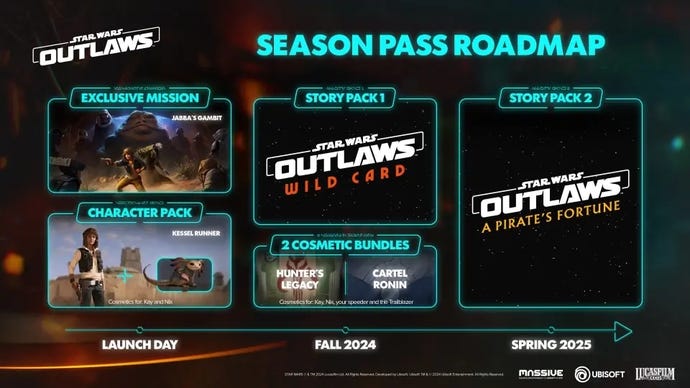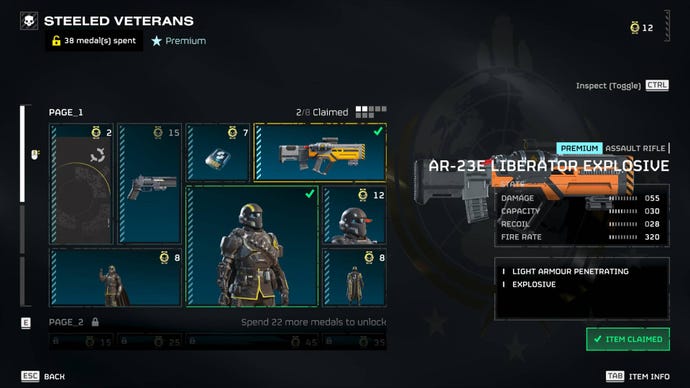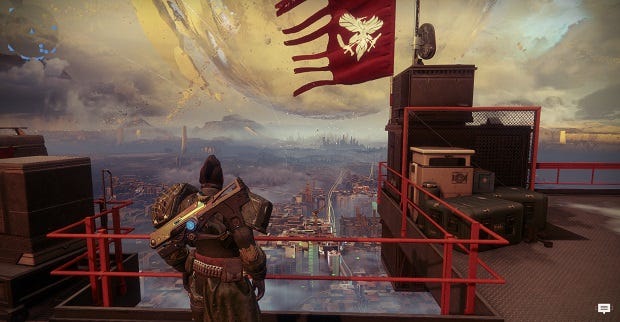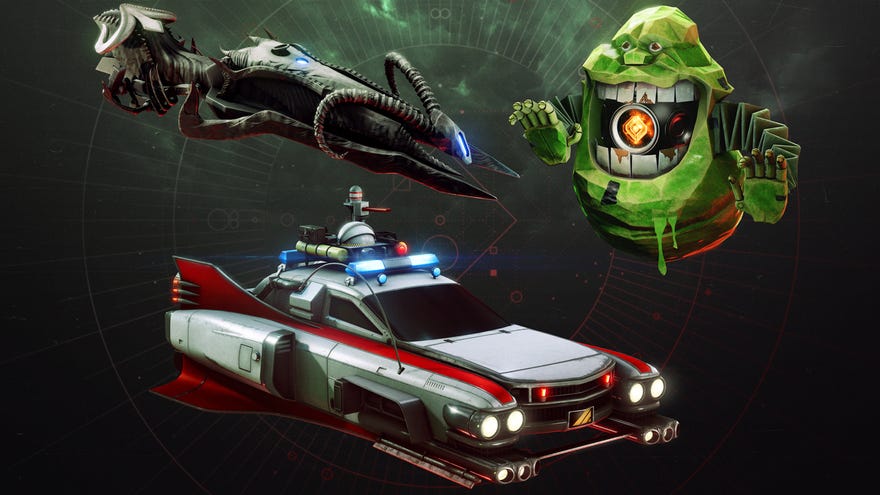We should redefine live service games as the living dead
But which kinds of living dead?
Why is every blockbuster video game now some kind of live service game? Speaking as a clueless idiot, the explanation I find most convincing is that it's an attempt to bridge the gap between the returns publishers want from video games, versus how much we're able or willing to pay upfront. "Triple-A" projects now cost exorbitant sums to develop, partly thanks to wider economic inflation, but also because publishers have spent decades teaching players that every sequel has to be More and Shinier. Premium game prices have not risen in proportion, and investors want growth, as they do.
Live service games sneak around this difficulty by dragging out the time we spend playing them. Whether premium or free-to-play, they seek to install themselves as habits by means of regular, planned updates and additions. This is time that can be monetised by way of a subscription model, time in which other products may be sold to you, like skins and paintjobs, and time that becomes a commodity in itself, "engagement", which can be transmuted and exploited to various end. I'm not sure it's ever been expressed this way in any press release boast about longevity, but the unspoken principle/logical extrapolation seems to be that ideally, a live service game should keep us plugged in and plugging away till we die.

While this strategy dates back to the original MMOs, the infancy of Minecraft, and the rise of free-to-play mobile games in the noughties (especially in China), the serious application of live service thinking to all games begins, I think, in the hollering 2010s. Major publishers have done very well out of it: according to one report, EA and Activision grew by around $80 billion as a result of their live service investments from 2012 to 2018. The music is slowing, however. This year has seen some notable live service game flops, amplified by the wider fallout from "over-ambitious" corporate expansion during the Covid lockdown gaming boom. Rocksteady's Suicide Squad has been written up as a $200 million loss, while Sony's hero shooter Concord was deemed so inadequate at launch it was actually yanked from sale. Ubisoft's ten-year "quadruple-A" nautical lifestyle sim Skull And Bones is not expected to break even. While a few publishers continue to push live service game development, others are hedging their bets. The live service element isn't the only or even primary reason for why the above games have struggled, but I get the sense that the business model's overt predatoriness and lack of enchantment is finally catching up with it.
Even before they became ubiquitous, live service games felt like a burden. They are inherently exhausting to think about. The business model is the experience in a way that it isn't for anything you "buy once" and theoretically enjoy in your "own time", away from the sludgepumps of commerce - it breaks the golden rule that art created under capitalism should at least feel like it's an escape from capitalism, by forcing you to think of playing as an on-going interaction with an evolving product. Again, the unspoken hope is for that product to evolve indefinitely. Aside from leeching away time and attention from other games, I think this has a cataclysmic effect on the experience of the live service game itself, one we have grown sadly accustomed to. It's not just that there might be a store full of dodgy microtransactions, which the game is forever trying to nudge you toward: defining the experience as a live service results in a game that is fundamentally devoid of purpose or structure, because it is always bleeding away into the future.
In the fine tradition of armchair leftist mystics who dream of writing That One Passage From Walter Benjamin, I do hereby and henceforth propose a redefinition of the live service game as the undead game, the game that wants to live forever by devouring our time. It's a framing that allows for some fun distinctions. On the one hand, you've got the zombies - cheaply-produced, often free-to-play titles with generic fixtures and minimal story component that gracelessly munch away at whoever they can lay their hands on.
Zombified live service games are where you see the greatest emphasis on progression for its own sake, on the piecemeal acquisition of gear and the incremental improvement of stats, because the promise of quantifiable "more stuff" is the simplest way to keep players coming back. At the same time, there can be no real progression in these games, because when a game is characterised as indefinite, the idea of progress becomes meaningless. There must always be another level to shoot for, more gear and abilities to unlock, more synergies to discover. The zombie's hunger can never be sated.
Among the more depressing ways live service games try to dramatise and redeem their "zombieness" is to pair the live service element with a "forever war" of some kind, akin to the US invasion and occupation of Iraq - a usefully unresolved conflict where players intervene as private military contractors. It's not always that openly chilly. It might be you're signing up to the Adventurer's Guild, rather than joining Blackwater. It may be that you're a Descendant or a Freelancer, rather than a PMC. But whatever the label you're given, the basic premise is that you're a licensed entrepreneurial killer, profiting from a post-historical purgatory of ruins and insurgent factions.

Helldivers 2 both epitomises the PMC framing and subverts it. The game's trick - following in the bootprints of Planetside - is to turn the zombie framework of the live service into your unspoken antagonist, by re-characterising it as a series of assignments and rewards doled out by a fascist super-government or "managed democracy", which players are taught to both mistrust and worship. It takes the cheesy military propaganda satire of Starship Troopers and updates it into a knowing celebration of how today's online video games stampede us repeatedly into killzones for the sake of gold stars and bigger guns.
Helldivers 2 is a well-made shooter in itself, a game that rewards regular play even without the live service enticements and progression, but one of its key achievements is simply making a running gag of how it treats you like cannon fodder - a running gag that, at its worst, becomes sheer dogwhistle nihilism aimed at those who want to literally cosplay as fascist enforcers. The game's satire works like armour to shield you against any self-disgust you might feel about being lured back to the charnelpiles of Hellmire, yet again.
"Zombie" live service games are relatively easy to see coming and evade - they wear their progressionitis and dependency on microtransactions without ceremony, counting on an audience of players habituated to their grind, and willing to become zombies in turn. The same can't be said for the vampires.
These are debonair premium productions that might seem mortal and personable at a glance, with proper narrative components and some sense of style. But if these games offer narratives reminiscent of the great singleplayer yarns of old, the live service element forbids them from offering what stories traditionally offer - an ending and/or some catharsis. A game that wants to eat your time endlessly isn't allowed to provide closure. Villains are defeated only so that other villains may be introduced. Every finale has its dangling thread. Having seduced the villagers with fancy cinematics and voice-acted prologues, the vampires descend from their castles according to a seasonal cadence of major expansions and chapters, layering up the narrative a little more each time without ever resolving things to your satisfaction.
Destiny is a vampire, I think. I say that as somebody who liked Destiny and still plays the Warmind theme to psych themselves up - I've played a lot less of the sequel. The 2014 game arguably inaugurated the current live service craze among North American and European publishers, kindling FOMO in its biggest detractors and supplying other live service projects with a recognisable vocabulary of colour-coded rarity tiers and overall gear levels. As with Helldivers 2, Destiny's appeal at root is that it's a very well-made shooter, with sumptuous guns and wonderfully lavish, complex class and ability design. But it's also appealing, was appealing, because it cultivates lingering uncertainty and curiosity, including uncertainty as to whether the world-building and narrative are anything more than bullshit artistry.

Much of Destiny's ten-year multiple-release saga is woven around around The Traveller, the vast white orb dangling over the game's last surviving human city. I admire the spectacle of the Traveller, but it's high time we conceded that it is basically Peter Molyneux's Curiosity Cube with the play loops turned outwards. It's a Big Dumb Object that squats there making your mind itch while you polish off your weeklies, an unanswered question at the heart of many unanswered questions that have fomented years of speculation. It's the basis for Destiny's seductive vampirism: surely, there must be more going on here than meets the eye.
These are wonky caricatures, I know. They're also potentially dehumanising ones: however they function as institutions, live service games are the creations of thousands of people who may care deeply about their design. When live services crumble they take livelihoods with them; much as I'd like such products to go away, their disappearance needs to form part of a broad redistribution of power and resources, rather than mass layoffs and "strategic realignments" that leave the executives and their wealthiest investors in place.
All the same, I hope these are useful tools for thinking about live service games as the triple-A industry weathers its latest existential crisis. Feel free to come up with better analogies, or expand the menagerie: what kind of live service game is a ghoul, a ghost, or a werewolf?

